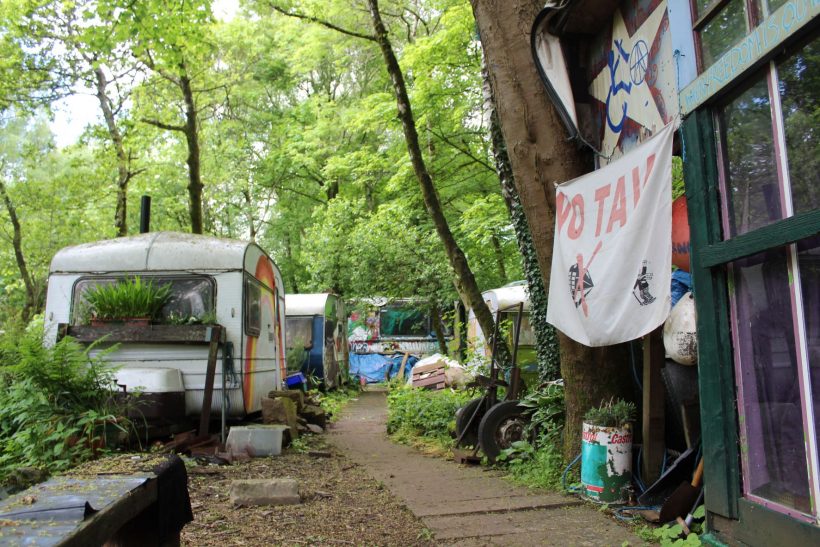While attending the Nuclear Ban Forum in Vienna (just after the 40th Anniversary of Faslane Peace Camp in June 2022) I interviewed Hauke, a peace activist from Germany. Here, he shares his experience protesting nuclear weapons at Faslane in Scotland.
How did you first get involved with nuclear disarmament?
I got involved with nuclear disarmament during the late 90s/early 2000s. Nuclear facilities at that time were a great topic in Germany so as a young person interested in politics, the issues of nuclear energy, nuclear waste and nuclear weapons were quite present.
Me and my friends were at the Summerfest Festival one week directly next to a nuclear waste dump in Northern Germany and during that week we got nonviolent direct-action training and a friend of mine signed up to a mailing list for activists.
A few weeks later she got an email saying that they were looking for volunteers who wanted to go to Scotland to Faslane to block the entrance of the Faslane Harbour, where the nuclear submarines are kept. At that time, I had no idea about Faslane, but it sounded great, so we decided yeah, let’s go in three days, and we travelled all the way there by bus.
That year there was a campaign where activists tried to block the gate every day and they were asking all over Europe if groups could come and block the gates. We were one day of that. It had already been ongoing for a few months, so the police had developed tactics – they weren’t surprised, and it took them half an hour to arrest us all.
In comparison to German police, they were all very polite and very friendly, it was unbelievable! What was also unexpected for us was that we got arrested together in mixed groups. In Germany you get arrested individually but in Scotland four of us were allowed to stay together and were even given newspapers.
They also had vegan food for activists in the Scottish police station – that’s something which still doesn’t happen in Germany. After 24 hours we were released and received a great hello when we stepped out – I was too tired to give any speech or interview, but other people did. Then we went back to the bus and returned to Germany.
What do you think was the positive impact of you campaigning in that way?
For me at the time, it was just a great adventure! We were young and wild, and it was a great adventure going there – four days just on the bus I couldn’t imagine doing anymore.
For me and my friends it was a great experience because there was this great group feeling doing something together. We felt we had a sense of international solidarity because of the welcome we received and how grateful people were that we came.
It was a lesson that there are other people in the world of all ages who have similar thoughts about nuclear waste and disarmament – that was a great experience for us as youngsters.
How would you say that that experience has affected the trajectory of the rest of your life and your involvement in nuclear disarmament?
When you are 18 every day is very new and interesting. What it gave me was [the confidence] to think big. Why not block these facilities there a whole year? Why not try it?
They also told us in Scotland that of course at first it wasn’t blocked every day, that they started with four weeks every day, and then it became bigger and bigger.
But if it doesn’t work out it doesn’t matter anyway, it’s still a great thing to join in with. I’m showing up, it’s not just a Scotland thing, there are people from all over Europe who care about it.
What I also learned was not to be shy around older generation, simply to address them. And don’t be shy to address people from other countries with political issues – they will understand and support you.
What is your final message to any young activists in Scotland who are considering getting involved with the Faslane Peace Camp but have reservations?
Simply get started. Don’t ask for permission. Stand for your ideas and it will work out.






